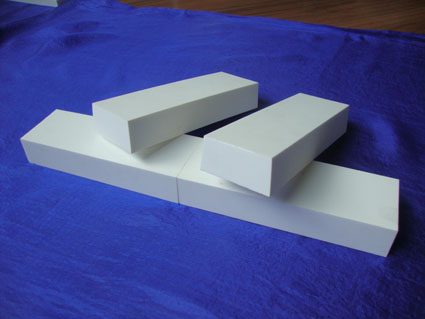Alumina Ceramic Tiles Protect Machinery From Corrosion and Erosive Wear
Alumina ceramic tiles provide effective protection from wear in bulk material handling systems, piping and equipment by preventing corrosion, erosion and sliding abrasion to extend their lifespan and extend service life of easily worn equipment and systems.
Production methods of alumina ceramic substrates typically involve tape casting, acidic methods and surface machining – all methods which create uneven microstructures that lead to increased residual stresses at cutting edges.
Durability
Our Alumina Ceramic tiles boast unparalleled durability, resisting impact, erosion and sliding abrasion without succumbing to wear-related damage or degradation – making them the ideal choice for use in material handling and processing applications. They also protect machinery against corrosion hazards. In terms of wear resistance they outshone lower grade materials such as carbon ceramic or stainless steel by 10- 20 times!
This premium material is chemically inert and resistant to acids and alkalis at elevated temperatures, making it the ideal solution for use as a lining material for transfer chutes, sumps, centrifuge screens and hoppers. Hơn nữa, its use lining cyclones increases flow efficiency and decreases frictional losses while decreasing frictional losses; furthermore it serves as an excellent catalyst support with high temperature stability.
Alumina ceramic tiles boast unparalleled heat resistance, outperforming materials like stainless steel and cast iron. This is achieved via a meticulous manufacturing process involving pressing, heating and sintering in a tunnel kiln – the result is ceramic lined elbows which can withstand intense pressures found in power generation applications and mining operations – especially important when used for transfer chutes and sump lining that often experience erosion from mining slurries or power plant fly ash; additionally this reduces operational inefficiencies by decreasing need for lubricants thereby increasing operational efficiencies overall.
Corrosion resistance
Corrosion resistance of alumina ceramic tiles is an integral factor when selecting materials for various applications. Alumina ceramic is highly resistant to acids, alkalis, salt solutions and organic solvents while resisting erosion caused by abrasion and impact – qualities which make them particularly suitable for material handling systems where chemical attack and erosion may be common risks. Therefore they make an excellent choice as equipment lining material conveying and bulk material handling systems where abrasion and chemical attack may pose major dangers.
Alumina boasts diamond-hard hardness and superior mechanical strength, making it the perfect material to withstand demanding applications. Alumina outperforms steel in wear resistance by 12 times and can withstand temperatures of 500 degC without incurring severe wear damage, making it suitable for protecting industrial equipment against severe abrasive and high temperature wear wear.
Corrosion damage to alumina ceramics depends on their exposure to an aggressive environment, with concentration and time playing key roles. Corrosion of these ceramics occurs through an electrochemical reaction which removes metal ions from their surfaces – this process may be mitigated by sintering these ceramics at lower concentrations of silica, alumina and other impurities.
An alumina ceramic material can be further improved to increase its resistance to acid and alkaline media by adding corundum or mullite phases during sintering. Doing this increases resistance against acid damage and enhances alkaline solutions resistance as well as providing improved resistance against corrosion damage.
Abrasion resistance
Alumina ceramic tiles provide an effective means of protecting equipment surfaces that could be damaged through friction or abrasion, thanks to their impact resistance, wear-resistance, corrosion resilience and high temperature endurance. By helping extend both its lifespan and performance, this powerful combination helps prolong material handling equipment’s lifetime and performance.
This material is often utilized as a lining material in chutes and hoppers that may be subject to sliding and impact abrasion, thanks to its dense structure which offers superior toughness, durability, corrosion protection in harsh chemical environments, as well as toughness against erosion damage. It provides protection for equipment from potential abrasion damage while offering corrosion and erosion resistance properties.
Laser-controlled remelting of alumina tile surfaces offers potential to produce uniform microstructures with low melting points and increased densities than traditional methods can. In this study, tiles were exposed to laser beams at two power levels for this technique. Temperature and stress fields at the surface of an irradiated area were predicted using a computational fluid dynamics model, with results showing that laser-treated alumina tile surfaces demonstrated greater first and second law efficiency at higher laser power levels. Laser-controlled remelting of slurries was found to produce less microcracks and delamination at the kerf interface, providing further proof that laser-controlled remelting is an efficient and cost-effective surface treatment approach for treating Alumina ceramic tiles, while providing effective abrasion and erosion protection. Ngoài ra, this process can also be applied to other applications requiring antiabrasion protection such as carpet flooring.
Lightweight
Alumina ceramics’ lightweight properties make them easy to work with and transport, making them suitable for material handling applications such as conveyor and bulk material equipment or piping systems. Hơn nữa, their wear resistance provides exceptional wear protection against erosion or abrasion from occurring within equipment. Comparable to steel, alumina ceramic is over 12 times lighter, making it an excellent choice for high temperature environments such as power generation or chemical processing. Alumina ceramics are exceptionally strong and long-wearing materials, boasting impressive heat tolerance and corrosion resistance properties that make them an excellent choice for industrial wear-resistant components and linings. Contrary to other forms of ceramics, alumina ceramics are created using finely ground particles that reduce voids for greater uniformity and density, thus increasing their longevity while helping prevent degradation over time. Ceramic products need to be maintained within certain moisture content ranges in order to remain viable, and LECO Corporation’s AMH43 Moisture Determination Analyzer is an ideal tool to do just that. Fast and user-friendly, it offers various test parameters suitable for various applications.
